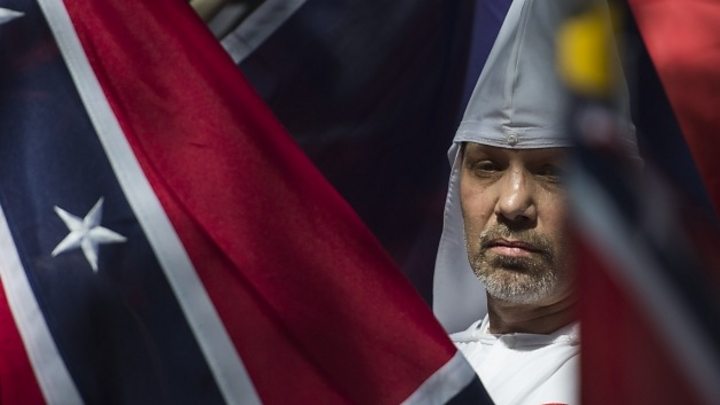
US President Donald Trump is facing criticism from both Republicans and Democrats for his response to violence at a Virginia white supremacist rally.
A woman was killed and 19 were injured when a car ploughed into a crowd of counter-protesters in Charlottesville.
Mr Trump condemned violence by "many sides" - but stopped short of explicitly condemning the far-right.
The White House has since clarified in a statement that his condemnation included white supremacists.
"The president said very strongly in his statement yesterday that he condemns all forms of violence, bigotry and hatred. Of course that includes white supremacists, KKK, neo-Nazi and all extremist groups," a spokesperson said on Sunday.
There were dramatic scenes later in the day as one of the organisers of the march, Jason Kessler, was chased away by protesters during a press conference.
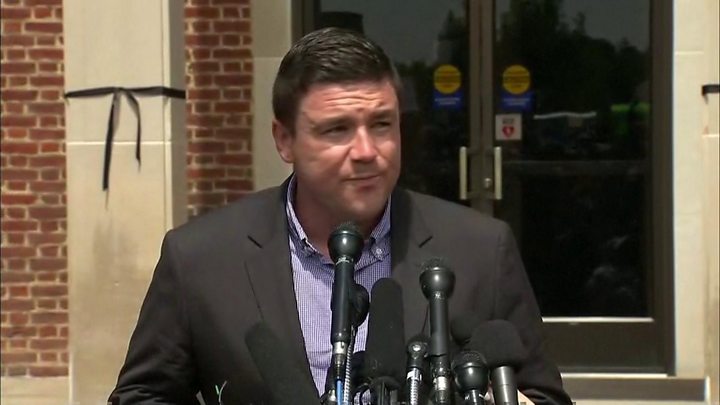
What happened in Charlottesville?
Hundreds of white nationalists converged for Saturday's "Unite the Right" march, called to protest against the removal of a statue of a general who had fought for the pro-slavery Confederacy during the US Civil War.
The far-right demonstrators, who included neo-Nazis and Ku Klux Klan (KKK) members, clashed with counter-protesters. People punched and kicked each other, and pepper spray, used by both sides, filled the air.
The crowd in Charlottesville, almost entirely white and male, put their arms up in Nazi salutes and cheered on the former grand wizard of the KKK, David Duke.
- A reckoning in Charlottesville
- In pictures: Charlottesville protest
- Why Trump's reactions shouldn't surprise us
As the rally was dispersed, a car was driven into a crowd of counter-protesters, the force of the crash flinging people into the air.
A 32-year-old woman, Heather D Heyer, was killed in the crash, Charlottesville Police Department said.
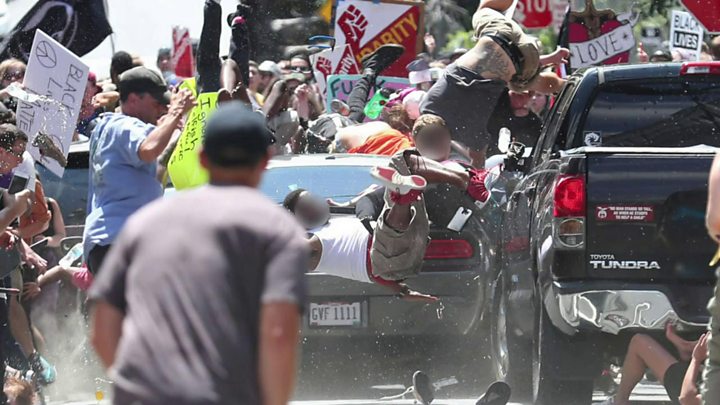
Twenty-year-old James Fields from Ohio, the alleged driver, is in detention on suspicion of second-degree murder and the FBI has opened a civil rights investigation.
Apart from the car-ramming incident, Charlottesville police said at least 15 were wounded in other violence related to the far-right march.
The governor of Virginia, Terry McAuliffe, said that his only message for the white supremacists who had come to Charlottesville was "Go home".
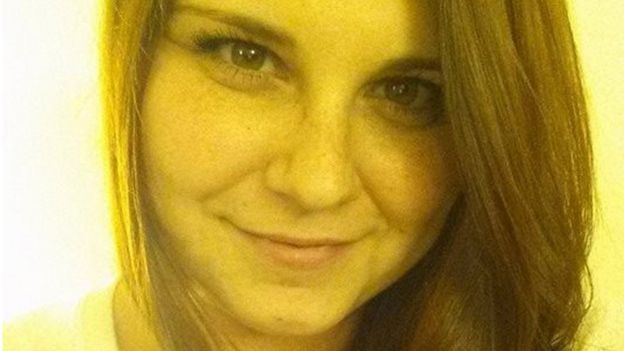 FACEBOOK
FACEBOOK
March organiser Jason Kessler was heckled, booed and eventually forced to run away during a press conference for "Unite the Right" on Sunday.
Amid protester chants of "shame on you", Mr Kessler blamed the police for not preventing the violence, which he condemned. But he also reiterated the organisers' right to hold the rally.
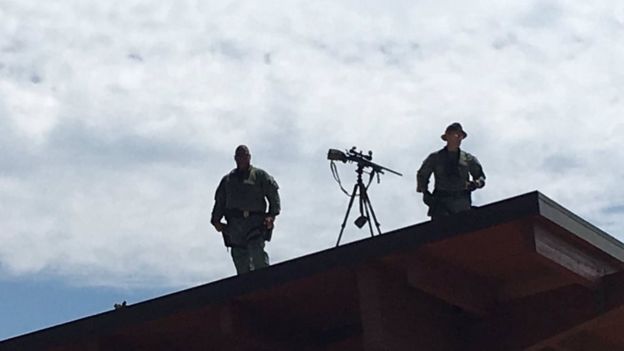
Some observers say that Mr Trump's election to the White House has re-energised the far right across the US.
The Southern Poverty Law Center, a civil rights organisation, says that "Trump's run for office electrified the radical right, which saw in him a champion of the idea that America is fundamentally a white man's country."
- Are right-wing groups on the rise?
- America's alt-right movement
- Why do people still fly the Confederate flag?
How did President Trump react?
Mr Trump said he condemned "in the strongest possible terms this egregious display of hatred, bigotry, and violence on many sides".
"The hate and the division must stop right now," he told reporters, speaking in New Jersey, where he is on a working holiday. "We have to come together as Americans with love for our nation."
But his comments did not explicitly condemn the white extremist groups involved in the rally.
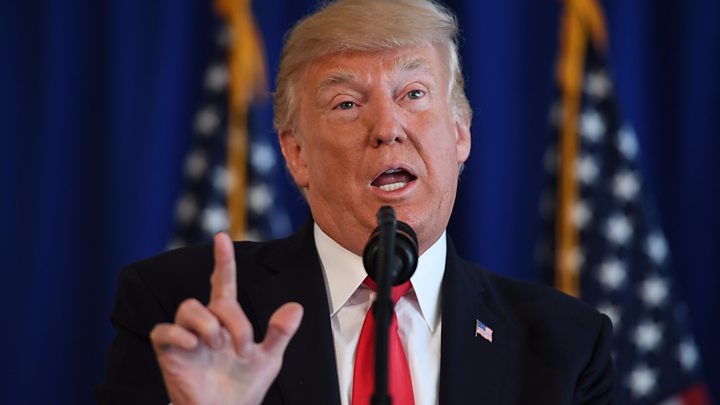
Asked whether the car-ramming was domestic terrorism, Mr Trump's National Security Adviser HR McMaster said "anytime that you commit an attack against people to incite fear, it meets the definition of terrorism".
Mr Trump's daughter too also appeared to offer stronger condemnation than her father.
The clue was in the campaign
Anthony Zurcher, BBC North America reporter
Clues for how the president would react to such a situation were scattered across his presidential campaign.
In February 2016, Mr Trump initially declined to disavow support from the Klu Klux Klan and David Duke, the former Klan leader who became a Louisiana Republican politician.
"Any candidate who cannot immediately condemn a hate group like the KKK does not represent the Republican Party, and will not unite it," Senator Tim Scott of South Carolina, the first black Republican elected from a Southern state since 1881, said.
After a week, Mr Trump gave a firm statement denouncing the KKK, but his initial hesitance would be an issue for the remainder of his presidential race.
If, as Mr Trump's critics suggest, his statements following the Charlottesville incident were yet another "dog whistle" to white supremacists, there's evidence that the message was clearly heard.
"Trump comments were good," one poster on the neo-Nazi website The Daily Stormer wrote. "He didn't attack us. He just said the nation should come together."
What are people saying about Trump's statement?
Mr Trump's comments did not go far enough for many Democrats and members of Mr Trump's Republican party.
Republican Senator Cory Gardner tweeted: "Mr President - we must call evil by its name. These were white supremacists and this was domestic terrorism."
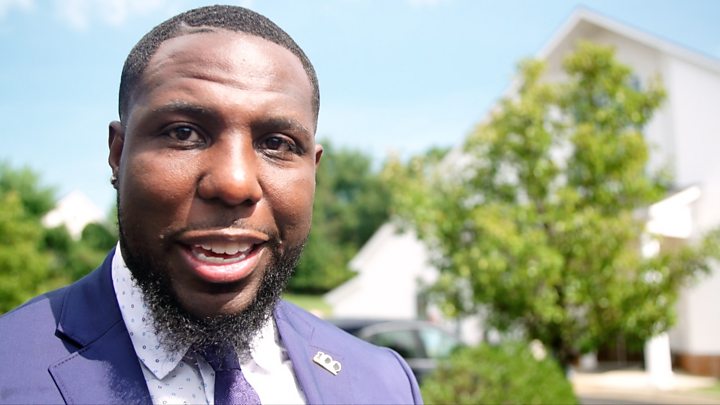
"Very important for the nation to hear [President Trump] describe events in #Charlottesville for what they are, a terror attack by #whitesupremacists," Republican senator Marco Rubio tweeted.
Another senior Republican, Ted Cruz, called the car-ramming a "grotesque act of domestic terrorism" and there were more strong words from Senator Orrin Hatch of Utah.
House Democratic leader Nancy Pelosi said "the president's talk of violence 'on many sides' ignores the shameful reality of white supremacism in our country today".
Mr Trump's former Democratic rival for the presidency, Hillary Clinton, said "every minute we allow this to persist through tacit encouragement or inaction is a disgrace and corrosive to our values".
- Why Trump's reaction is no surprise
- A reckoning in Charlottesville
- Charlottesville protest pictures
- White supremacy: Are US right-wing groups on the rise?
- Virginia governor tells white supremacists: 'Go home'
- Charlottesville: One killed in violence over US far-right rally
- Car rams into crowd of people at Charlottesville rally
- Charlottesville: Trump condemns hatred but dodges question
- White nationalist rally at University of Virginia

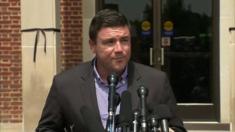
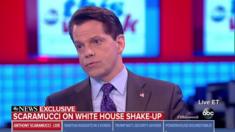
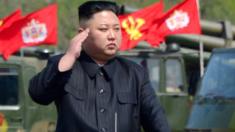
No comments:
Post a Comment